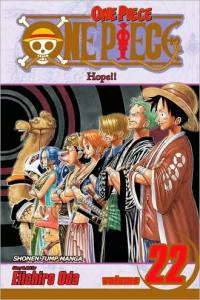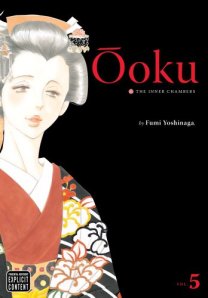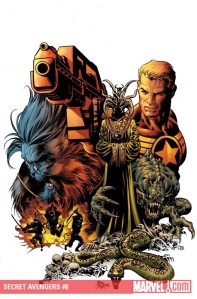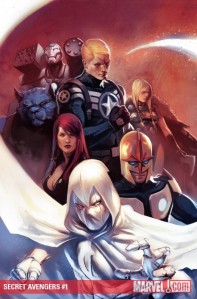I often cite the Riverdale crowd as my entry point into comics, and it’s perfectly true. The first comics I remember reading with any regularity are from the Archie family, and I spent many pleasurable hours with that crowd. But the comics that turned me into a fan, the ones that turned an activity into an enduring hobby, were undeniably those that featured Marvel’s Avengers. It even reached a point where I couldn’t bring myself to enjoy The Fantastic Four, because each issue promised “The World’s Greatest Comic Magazine!” and that was clearly a lie.

In retrospect, the thing that drew me to the Avengers and, to a lesser extent the Defenders and the X-Men, was the notion of the family of choice – people without much in common, people who at times ostensibly disliked each other, coming together because of a shared philosophy. The Avengers came together because they wanted to accomplish something – fighting substantial threats that were too much for individual heroes – while maintaining individual goals, whether that was redemption for past misdeeds, finding a place in a world where you don’t fit, or just enjoying the comfort of like-minded comrades.
The other quality at the core of the Avengers’ appeal to me was the sheer variety of characters, from the enormously powerful to the enormously skilled. Some members were unvarnished in terms of virtue while others had decidedly dodgy pasts and complex motivations. They didn’t always get along, but the bickering was one of the spices in the stew. Gods and carnies, soldiers and freaks, robots and knights could join forces, and each could be better than they were individually simply by virtue of their loosely shared identity as Avengers.


So it’s perhaps not surprising that, as I enjoy Eiichiro Oda’s One Piece, I find similarities between the Straw Hat Pirates and Earth’s Mightiest Heroes. If anything, the Straw Hats are a distillation of everything I like best about the Avengers minus of a lot of things I didn’t. The moments that rankled in Avengers comics were the ones over which the writers didn’t have any control – the comings and goings of characters that were franchises in their own right, like Captain America, Thor, and Iron Man. Every Straw Hat belongs to One Piece lock, stock and grog-filled barrel. Everything that matters (or at all) happens to them in this comic, and I know they won’t be yanked away from me due to the machinations of anyone but Oda himself.
Even the dissimilarities between the two teams end up being similarities. While the Avengers became notorious as a sort of rehab center for the formerly villainous (the Scarlet Witch, Hawkeye, the Black Widow, Swordsman, and so on), the Straw Hats function as a kind of mirror opposite. Characters who previously lived relatively blameless lives (bounty hunter Zolo, small-town oddity Usopp, reindeer physician Chopper) decide that blamelessness isn’t all it’s cracked up to be in the face of the lure seafaring adventure and Luffy’s bizarrely charismatic, seemingly unfounded certainty. (Some would argue, me among them, that the Straw Hats aren’t really all that adept at villainy, as they barely ever do any actual pillaging, but let’s just stick with the foundational premise that pirates are, by definition, outlaws. And really, unless defending yourself against attack counts for full marks as heroic, the Avengers don’t always live up to their mission either.)
For me, the dissimilarities just reinforce the idea that the Straw Hats, like the Avengers, are something larger than individuals. They can accomplish more collectively than they can individually, no matter how skilled or strong they are. And the Straw Hats’ roles are stated in ways that aren’t made explicit in the Avengers: Luffy is the Captain, Usopp is the Marksman, Nami is the Navigator, and so on. (The current Avengers writer recently took a big meta stab at each member’s iconic function, but that trick almost never works. Grant Morrison couldn’t pull it off with his JLA “pantheon,” either.)
And if the Straw Hats’ stated intent isn’t to fight evil and injustice, they do so with a proactive vigor that the Avengers should envy. How many One Piece arcs are driven by the Straw Hats discovering that something isn’t right and taking steps to rectify it for the benefit of the innocent or oppressed, no matter what the cost might be to them personally? These acts of altruism may just as often be a result of the crew’s thirst for adventure, but they inevitably come from a desire to do the right thing, at least insofar as they view matters of right and wrong. Half of the time, the Avengers’ adventures are driven by an assault from someone with a grudge, often the same person with the same grudge. If the Straw Hats run into an old opponent, the dynamic has often changed based on past events, which opens new and interesting possibilities.
There are also resonant individual parallels. Nami can be reasonably compared to the Wasp in that she’s a charming boy-magnet who is much more formidable than she initially appears. Of course, Nami’s primary function isn’t romantic, so she has a leg up on the Wasp in that regard. (Over time, the Wasp managed to transcend that set albatross herself, but I think she’s dead now, so Nami still wins.)
Everyone gets to be a little bit of a Hawkeye. Usopp gets to overcome his inferiority complex with skill and dedication. Sanji gets the hopeless crushes, the fruitless flirting, and the inclination to bicker with the alpha male. Zolo gets to be the badass by virtue of rigorous training. (Zolo is a bit greedy in that he also gets bits of Captain America’s stoicism and Iron Man’s glamour.) I could theoretically credit Sanji with a little bit of Jarvis, at least on the culinary front, but Sanji has none of the butler’s fastidiousness or fatherly virtues.
Nico Robin gets to be all of the Avengers’ various shady ladies in one glorious package. Like the Scarlet Witch, she’s tarred with the brush of her heritage. Like the Black Widow, it’s not unreasonable to question Robin’s motives, at least initially. Like Mantis, Robin is allowed to be her best self through the support and friendship of her comrades.
Sweet Chopper gets bits of some of my favorites, too. He’s like the Vision, fully experiencing the world for the first time in the company of friends. He’s also like the Beast, reliably delivering comic relief while maintaining a core of sadness and even a tinge of potential menace. Franky has the foe-to-friend aspect of characters like Swordsman or Wonder Man, without being as pathetic as either of those mopes. It’s a little early to tell what, if any, assembler will draw parallels to Brook.
And Luffy seems conceived to redeem qualities of the Avengers who mattered least to me. Like Captain America, he’s a natural leader, but Luffy is even more of a natural leader in that he rarely needs to assert his authority. Like Thor, Luffy is ridiculously powerful, but unlike Thor, he seldom feels the need to speechify on the subject. Like the Hulk, Luffy is at times random in his behaviors and choices, and he’s most answerable to his appetites, but the randomness and the appetite are glorious and funny instead of being obstructions. They’re part of Luffy’s rhythms, and his crewmates know how to roll with them in ways the Avengers never did with the Hulk. (Luffy is emblematic of Oda’s ability to show rather than tell. Oda allows readers to sense all of these things about Luffy, to realize the truth of them, without anyone having to stand around and discuss them.)
Another quality that I loved about the Avengers is noticeably absent from One Piece, that being the romantic subplots that proved to be such a substantial part of the narrative. This isn’t really problematic, in my opinion. I’ve talked with people about how One Piece seems to defy romantic fan fiction because romance is simply not among Oda’s narrative concerns. He simply doesn’t poke that ‘shipper reflex in the way that many other shônen manga-ka do. He doesn’t do anything to demean that impulse, but he does nothing to encourage it either.
And the things Oda does nail are the subplots about personal growth. He executes these both obliquely and explicitly. Readers can watch Luffy’s qualities evolve out of the corner of their eyes while seeing a more direct address of Usopp’s insecurity among people who overpower him in so many ways but match him in heart. Watching Robin re-learn how to hope and trust is lovely in some of the same ways it was to watch the Scarlet Witch become a formidable, independent heroine. And it’s all woven in so nicely with the goofy bombast that it might surprise you that you’re being moved as you’re being entertained. Better still, there’s nothing resembling Hank Pym’s decades-long struggle to decide just what kind of creepy loser he wants to be.
So, yes, One Piece is routinely what Avengers was to me at its very best. It’s about the family that you make because you trust people and respect them. It’s about big, crazy battles that seem lost from the start, until teamwork and individual courage come into play. And it’s about a seemingly incongruous group of equals becoming better and stronger in each others’ company.
(For a look at One Piece‘s resemblance to another super-hero franchise, please swing by Sam Kusek’s A Life in Panels. You’ll see why.)







 Posted by davidpwelsh
Posted by davidpwelsh 


































